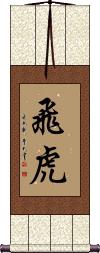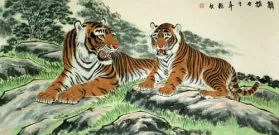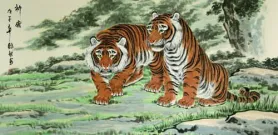Many custom options...
And formats...

Tigers in Chinese / Japanese...
Buy a Tigers calligraphy wall scroll here!
Personalize your custom “Tigers” project by clicking the button next to your favorite “Tigers” title below...
Flying Tigers
飛虎 is the short, or rather, Korean title of the “Flying Tigers.”
This short title is not very often used in China but is a title used in Korea. When the Flying Tigers volunteers were in China, Korea was also occupied by Japanese forces. Because many Korean civilians were enslaved and killed at the hands of the Japanese soldiers, any group that fought against the Japanese at that time was held in high esteem by the Korean people.
Note: I suggest the other 3-character entry since this group was so strongly related to China.
飛虎 is also used as an adjective in Korean to describe a courageous person.
Flying Tigers AVG
飛虎隊 is the full Chinese title of the “Flying Tigers Group.”
These were the American pilots that volunteered to go to China and fight the Japanese before the entry of the USA into World War Two. These fighter pilots were so esteemed in China that fallen American pilots could always find refuge in villages and safe passage and escape to areas of China that were not occupied by Japan at that time. Chinese villagers helped such fallen pilots with full knowledge that when the Japanese occupation forces found out, all the men, women, and children in the village would be massacred by Japanese troops (there are more than a few known cases of such massacres).
The Flying Tigers successfully kept supply lines to the Chinese resistance open and divided Japanese forces at a crucial time while America prepared to join WWII officially.
A wall scroll like this honors the men who risked or gave their lives as noble volunteers and is a reminder of the best moment in the history of Sino-American relations.
These three characters literally mean “flying tiger(s) group/team/squad.”
Note: Hanging these characters on your wall will not make you any friends with Japanese people who are aware or this history (most Japanese have no idea, as Japan’s involvement in WWII has all but been erased from school textbooks in Japan).
Tiger Rumor
These four characters together relay the meaning that can be expressed in English as “When three people say there's a tiger running in the street, you believe it.”
Of course, there is an ancient story behind this idiom...
三人成虎 is actually a proverb that resulted from a conversation that occurred around 300 B.C.
The conversation was between the king of the Wei kingdom and one of the king's ministers named Pang Cong.
It was near the end of one of many wars, this time with the Zhao kingdom. Pang Cong was to be sent by the king to the Zhao kingdom with the king's son, who was to be held hostage. It was common at the time for a king to make his son a hostage to secure stable peace between warring kingdoms.
Before minister Pang Cong departed, he asked his king, “If one person told you a tiger was running in the street, would you believe it?.”
“No,” the king said.
The minister continued, “What if two people told you?”
The king replied, “Well, I would have my doubts but I might believe it.”
The minister continued, “So, what if three people told you that a tiger is running in the streets?”
The king replied, “Yes, I would believe it. It must be true if three people say it.”
The minister then reminded the king, “Your son and I are now traveling far away to live in the distant Zhao kingdom - much farther from your palace than the street. Rumors may fly about me in my absence, so I hope your majesty will weight such rumors appropriately.”
The king replied, “I have every trust in you, do not worry”
While the minister was gone, the king's enemies gossiped about minister Pang Cong on many occasions. At first, the king thought nothing of these comments and rumors. But slowly, as the rumors mounted, the king began to suspect ill of his minister.
Sometime later, when peace was well-established, the minister and prince were freed and returned to the kingdom of Wei. The king received his son BUT DID NOT EVEN SUMMON MINISTER PANG CONG TO THE PALACE!
Hopefully, this story will help you see how dangerous words can be when used to promote rumors or create ill will. And perhaps will inspire you not to believe everything you hear.
There is also a secondary suggestion in this idiom that gossip is as ferocious as a tiger. Some Chinese people who don't know the ancient story above may believe that this scroll means that rumors are as vicious as three tigers.
Note: This proverb appears in my Korean dictionary but is not well-known in Korea.
This in-stock artwork might be what you are looking for, and ships right away...
Gallery Price: $400.00
Your Price: $158.88
Not the results for tigers that you were looking for?
Below are some entries from our dictionary that may match your tigers search...
| Characters If shown, 2nd row is Simp. Chinese |
Pronunciation Romanization |
Simple Dictionary Definition |
猛虎 see styles |
měng hǔ meng3 hu3 meng hu mouko / moko もうこ |
More info & calligraphy: Fierce Tiger(1) fierce tiger; ferocious tiger; (2) Hanshin Tigers (baseball team); (female given name) Mouko fierce tiger |
飛虎隊 飞虎队 see styles |
fēi hǔ duì fei1 hu3 dui4 fei hu tui |
More info & calligraphy: Flying Tigers AVG |
両虎 see styles |
ryouko / ryoko りょうこ |
(idiom) two equal rivals; two tigers |
大顚 see styles |
dà diān da4 dian1 ta tien Daiten |
Da Dian, the appellation of a famous monk and writer, named 寶通 Baotong, whom tigers followed; he died at 93 years of age in A. D. 824; author of 般若波羅蜜多心經 and 金剛經釋義. |
虎狼 see styles |
korou / koro ころう |
(1) tigers and wolves; (2) (idiom) cruel and greedy brute |
虎豹 see styles |
kohyou / kohyo こひょう |
(1) tigers and leopards; (noun - becomes adjective with の) (2) daring person (animal, etc.); ferocious (person) |
降龍 降龙 see styles |
xiáng lóng xiang2 long2 hsiang lung kōryū |
To subdue nāgas, e.g. 降龍鉢 to compel a nāga to enter an almsbowl as did the Buddha; 降龍伏虎 to subdue nāgas and subjugate tigers. |
四小龍 四小龙 see styles |
sì xiǎo lóng si4 xiao3 long2 ssu hsiao lung |
Four Asian Tigers; East Asian Tigers; Four Little Dragons (East Asian economic powers: Taiwan, South Korea, Singapore and Hong Kong) |
猛虎弁 see styles |
moukoben / mokoben もうこべん |
(slang) (joc) thick Osaka dialect (as supposedly spoken by Hanshin Tigers fans) |
虎の仔 see styles |
toranoko とらのこ |
(1) tiger cub; (2) treasure (as it is said that tigers treasure their young) |
虎の子 see styles |
toranoko とらのこ |
(1) tiger cub; (2) treasure (as it is said that tigers treasure their young); (female given name) Toranoko |
陳納德 陈纳德 see styles |
chén nà dé chen2 na4 de2 ch`en na te chen na te |
Claire Lee Chennault (1890–1958), American military aviator and brigadier general, commander of the Flying Tigers 飛虎隊|飞虎队[Fei1 hu3 dui4], a volunteer group that assisted China in resisting Japanese forces during World War II |
トラの仔 see styles |
toranoko トラのこ |
(1) tiger cub; (2) treasure (as it is said that tigers treasure their young) |
とらの子 see styles |
toranoko とらのこ |
(1) tiger cub; (2) treasure (as it is said that tigers treasure their young) |
兩虎相爭 两虎相争 see styles |
liǎng hǔ xiāng zhēng liang3 hu3 xiang1 zheng1 liang hu hsiang cheng |
lit. two tigers fighting (idiom); fig. fierce contest between evenly matched adversaries |
如狼似虎 see styles |
rú láng sì hǔ ru2 lang2 si4 hu3 ju lang ssu hu |
lit. like wolves and tigers; ruthless |
暴虎馮河 暴虎冯河 see styles |
bào hǔ píng hé bao4 hu3 ping2 he2 pao hu p`ing ho pao hu ping ho boukohyouga; boukohyouka / bokohyoga; bokohyoka ぼうこひょうが; ぼうこひょうか |
lit. fight tigers with one's bare hands and wade across raging rivers (idiom); fig. to display foolhardy courage (yoji) foolhardy courage |
虎踞龍盤 虎踞龙盘 see styles |
hǔ jù lóng pán hu3 ju4 long2 pan2 hu chü lung p`an hu chü lung pan |
lit. where tigers crouch and dragons coil (idiom); fig. forbidding terrain |
虎踞龍蟠 虎踞龙蟠 see styles |
hǔ jù lóng pán hu3 ju4 long2 pan2 hu chü lung p`an hu chü lung pan |
lit. where tigers crouch and dragons coil (idiom); fig. forbidding terrain |
豺狼虎豹 see styles |
chái láng hǔ bào chai2 lang2 hu3 bao4 ch`ai lang hu pao chai lang hu pao |
lit. jackals, wolves, tigers and panthers (idiom); fig. nasty, cruel people |
降龍伏虎 降龙伏虎 see styles |
xiáng lóng fú hǔ xiang2 long2 fu2 hu3 hsiang lung fu hu |
to vanquish dragons and tigers (idiom) |
タイガース see styles |
taigaasu / taigasu タイガース |
Tigers (usu. sports team) |
ラッパツギ see styles |
rappatsugi ラッパツギ |
{go} (See ツギ・4,猫の顔) trumpet connection; lion's mouth; move that connects stones by creating two tigers' mouths |
坐山觀虎鬥 坐山观虎斗 see styles |
zuò shān guān hǔ dòu zuo4 shan1 guan1 hu3 dou4 tso shan kuan hu tou |
lit. sit on the mountain and watch the tigers fight (idiom); fig. watch in safety whilst others fight then reap the rewards when both sides are exhausted |
一山不容二虎 see styles |
yī shān bù róng èr hǔ yi1 shan1 bu4 rong2 er4 hu3 i shan pu jung erh hu |
lit. the mountain can't have two tigers (idiom); fig. this town ain't big enough for the two of us; (of two rivals) to be fiercely competitive |
初生牛犢不怕虎 初生牛犊不怕虎 see styles |
chū shēng niú dú bù pà hǔ chu1 sheng1 niu2 du2 bu4 pa4 hu3 ch`u sheng niu tu pu p`a hu chu sheng niu tu pu pa hu |
lit. newborn calves do not fear tigers (idiom); fig. the young are fearless |
泰米爾猛虎組織 泰米尔猛虎组织 see styles |
tài mǐ ěr měng hǔ zǔ zhī tai4 mi3 er3 meng3 hu3 zu3 zhi1 t`ai mi erh meng hu tsu chih tai mi erh meng hu tsu chih |
Tamil Tigers |
阪神タイガース see styles |
hanshintaigaasu / hanshintaigasu はんしんタイガース |
(org) Hanshin Tigers (Japanese pro baseball team); (o) Hanshin Tigers (Japanese pro baseball team) |
兩虎相爭,必有一傷 两虎相争,必有一伤 |
liǎng hǔ xiāng zhēng , bì yǒu yī shāng liang3 hu3 xiang1 zheng1 , bi4 you3 yi1 shang1 liang hu hsiang cheng , pi yu i shang |
lit. if two tigers fight, one will get injured (idiom); fig. if you start a war, someone is bound to get hurt |
明知山有虎,偏向虎山行 |
míng zhī shān yǒu hǔ , piān xiàng hǔ shān xíng ming2 zhi1 shan1 you3 hu3 , pian1 xiang4 hu3 shan1 xing2 ming chih shan yu hu , p`ien hsiang hu shan hsing ming chih shan yu hu , pien hsiang hu shan hsing |
lit. to willfully go towards the mountain although knowing that it has tigers (idiom); fig. to take a risk despite knowing the dangers |
Click here for more tigers results from our dictionary
The following table may be helpful for those studying Chinese or Japanese...
| Title | Characters | Romaji (Romanized Japanese) | Various forms of Romanized Chinese | |
| Flying Tigers | 飛虎 飞虎 | fēi hǔ / fei1 hu3 / fei hu / feihu | ||
| Flying Tigers AVG | 飛虎隊 飞虎队 | fēi hǔ duì fei1 hu3 dui4 fei hu dui feihudui | fei hu tui feihutui |
|
| Tiger Rumor | 三人成虎 | sān rén chéng hǔ san1 ren2 cheng2 hu3 san ren cheng hu sanrenchenghu | san jen ch`eng hu sanjenchenghu san jen cheng hu |
|
| In some entries above you will see that characters have different versions above and below a line. In these cases, the characters above the line are Traditional Chinese, while the ones below are Simplified Chinese. | ||||
Successful Chinese Character and Japanese Kanji calligraphy searches within the last few hours...








